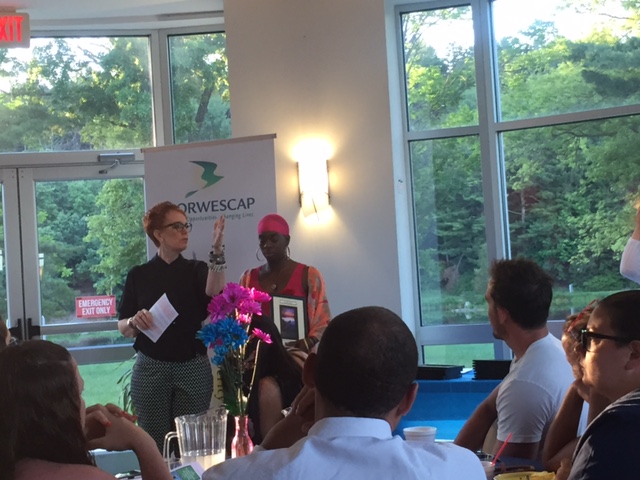Through the Pathways 2 Prosperity program graduates have created and enacted action plans to lift themselves out of poverty by reducing their debt, saving money, improving their credit score and building entrepreneurship opportunities. This June, 23 graduates joined the ranks as the eighth class of graduating Path Leaders.
Pathways 2 Prosperity (P2), a program of Northwest Jersey Community Action Partners (NORWESCAP) in collaboration with the Center for Prevention and Counseling and the United Way, is an innovative two generation initiative to end poverty. “For every $1 invested in P2, $2.40 is returned to the community in new earned income,” said Dianna Morrison, program director.
The Sussex County based program is a three phase process that provides an educational curriculum for both adults and children. Weekly meetings at the Sparta UMC provide dinner and the opportunity to create peer support with fellow Path Leaders and networks across economic lines with volunteers.
Beginning with a 20-week motivational career and life planning curriculum, Path Leaders evaluate how poverty impacts their life and the community, assess available resources, and identify reasons for moving out of poverty. Following the development of their action plan, Path Leaders graduate from Phase I. Phase II begins with Path Leaders being matched with trained mentors who assist them in putting their Prosperity Plan into action. Weekly meetings continue with comprehensive education focusing on the skills and tools needed to make their Prosperity Plan a reality. Phase III begins as Path Leaders accomplish their goals and become mentors, committee members and volunteers, supporting the sustained growth of P2.
According to Morrison, the program is a community engagement model that has had great success. “In 2015, 42% of Path Leaders obtained employment, 82% have retained employment for 90 days or longer, 96% developed an action plan to overcome employment barriers, and 103 barriers were removed to obtaining employment,” said Morrison. Together, seven graduating classes have reduced debt by $97,782, saved $51,813, increased credit scores up to 100 points, and built entrepreneurship opportunities through small business startup and expansion.
“For the first time in a long time I believe that my future can be different than my past,” said one P2 participant. Another added, “Pathways helped me to find myself, and that was the most amazing feeling. Once I found out who I was, I was able to cope. If you don’t know who you are, you can’t take care of anything in a productive, positive way.”
“The mission is to foster the success of participants in school, home, and the community,” said Morrison. The curriculum complements the adult P2 agenda, focusing on social and emotional growth while encouraging appropriate group behavior found in school, community, and home environments. Emphasis is placed on literacy, volunteerism and community responsibility.
P2 collaborates with the Center for Prevention and Counseling to provide a youth entrepreneurship program called From Learning to Earning. Phase I of From Learning to Earning is the implementation of the 22-week Rural Entrepreneurship thru Action Learning (REAL) curriculum which provides a project-based learning environment aligned with national educational standards. REAL covers entrepreneurial skills, business plans, marketing, operational strategies and financial concepts. During Phase I, teens receive $10 per week, address barriers to inclusion such as gas expenses, and are taught pro-active financial behaviors. Following the completion of REAL, the teens pitch their business plan to a panel of local entrepreneurs who vote for up to five ventures, each receiving up to $500 to enter Phase 2: the kick start of their business. Fellow participants whose ideas were not funded can assist those that were. Phase 3 begins when REAL graduates return to be mentors to the next class. Teens can refine their plans and pitch them to the panel as many times as they would like.
Morrison said the outcomes from the first class are exciting. 14 teens graduated with business plans for micro businesses, seven teens received seed capital to launch their business, 100% of teens stayed in school, and 95% of participants’ demonstrated increased knowledge of the dynamics of entrepreneurship, marketing, presentation and leadership skills.
“The success of Pathways 2 Prosperity depends on volunteers donating their time and talent as well as community collaborations,” said Morrison. “Each volunteer, no matter the extent of their donation, shares in the success of the program, and shares in the success of our participants.” Volunteer opportunities include preparing weekly meals, assisting the youth program, mentoring children, tutoring and serving on one of the committees. There are volunteer opportunities for teens to serve as peer mentors and tutors to the Pathways youth. “Whatever time and gifts an individual or family has to share, there is a volunteer role in Pathways 2 Prosperity,” said Morrison.
Dianna Morrison encourages people in the Sussex County area interested in volunteering or learning more to contact her at dianna@centerforprevention.org or (973) 383-4787, extension 255.

